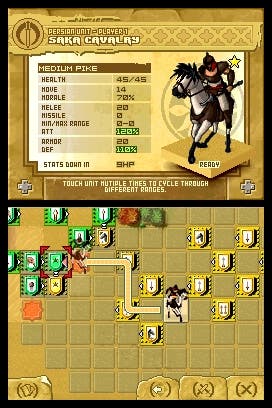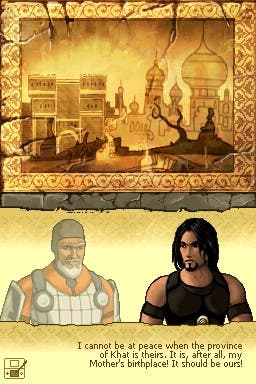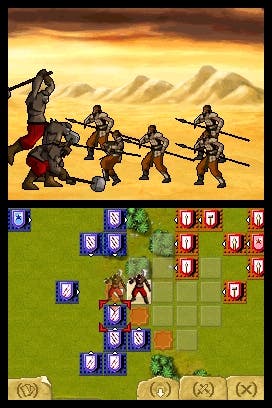Battles of Prince of Persia
Because Battles of Prince of Iran wouldn't sell nearly as well.
The DS offers some excellent opportunities for innovative reinventions of successful licences. It lends itself towards inventive slants on well-known names. With that in mind, I'd like to present a few pitches for game ideas, in the hope that fat publishers will hand me wads from their vast pockets filled with money.
Tomb Raider: Leap of Faith. The extremely popular Lara Croft is back! And she's bringing with her all the excitement of everyone's favourite party game, Twister! That's right - the DS's unique touch-screen finally provides the possibility of body-contorting interactive family fun, brought to life in the Tomb Raider universe in this brand new text-based adventure!
Splinter Cell: Fire In The Hole. Sam Fisher's awesome adventures have so far explored the dizzying worlds of international espionage. But what about when Sam has time off? Finally this missing portion of his life is brought to players through the magic of TV's Wipeout. In an exclusive deal, Paul Daniels provides his voice for the episodes of everyone's favourite daytime quiz that Sam will watch from the comfort of his armchair. Using the DS's microphone, players will be able to create Sam's voice, uselessly shouting answers at the pre-recorded footage on the screen. Sometimes while wearing those green goggles.
Battles of Prince of Persia. Set between the events of Sands of Time and Warrior Within, this tantalising latest tale of the nation's favourite Prince finally answers those questions you had about what he was up to all that time. In the form of a customisable card game! That's right - at long last the full extent of the Persia licence is exploited in a turn-based strategy, where Advance Wars meets Magic: The Gathering, in the tile-based battle sim card game everyone's been asking for... Oh, wait. Hang on. Did someone already do this one?
I Miss Nell
It reminds me of those weird little games you'd get in a Happy Meal, vaguely associated with the sponsoring film by having the Little Mermaid's face carelessly stuck to the plastic underside of the marble-rolling puzzle. They'd call it something like, "Ariel's Underwater Maze", and shrinkwrap. What the flipping crikey the Prince of Persia is supposed to have to do with this peculiar strategy is still a mystery, even after sitting through the laboured betwixt-mission exposition.
What we've got here is a tile-based strategy that doesn't so much ring a bell for those who've played and loved Advance Wars, as put the bell over your head and begin repeatedly thrashing it with a metal bin. Despite the peculiar inclusion of the collectable cards, it never stops tripping far fonder memories of Intelligent Systems' masterworks.
To begin at the beginning, one inevitably finds a tutorial. And like the best sort, BoPoP's is also the first level, guiding you through the action in context, interrupting every time a new feature is exposed, but trusting you to get on with things when repeating something previously explained. Splendid. Except for the rather frustrating habit of failing to explain features until after the first time you've had to muddle about with them. It's not a massive problem, but it does leave you feeling rather bewildered after what should have been the explanatory sequence. In fact, the game seems to be shamefully aware of this itself, even stating its concern that you might not understand what just happened. It adds, "Don't worry, keep at it until you do."

Ok, so it goes something like this. You have a stack of 30 cards, selected from a potential pool of 200 (although a small fraction of these at the start), from which seven are randomly dealt at the beginning of the first turn, or "Hour". Some control how many units you can move that turn, others give your guys stat boosts, extra turns, or extended moves, and others still let you inflict damage upon your enemy. Deploying these appropriately implies itself as the key to success. At the end of the Hour, you can discard any remaining that you don't want to roll over, and your hand is replenished to seven.
Armies are deployed on a battlefield, and then shuffled into combat. And here the Advance Wars tribute begins. After being dragged across the tiles, fighting consists of nothing other than the statistics of each side battling it out in an invisible roll, while an animation appears on the top screen that vaguely resembles the result. But barely. Where AW showed a little animation that briefly captured the back-and-forth tussle of your mismatched units, here there's a muddled mess with characters dying after their own attack, or seemingly not bothering to attack at all. Things only become clear after the fight's over and the damage figures, which very often don't seem to reflect the statistical nature of those involved, flash up on screen. AW may have been tough, but it was always excruciatingly fair. BoPoP manages the opposite: being a bit too easy, while appearing to cheat.
Generals are CO powers made literal - an extra-powerful character whose presence buffs the units around him, while delivering a hugely enhanced attack. He's kind of like the Queen on the amateur's chessboard. Lose him, and you can still win, but boy are you in trouble. This might be a more threatening danger if the enemy AI seemed vaguely aware of this, rather than merrily attacking the runts either side of him, or happily letting him march his way to take on their own boss.
Campaigning Against War
The Campaign mode casts you as the Prince of Persia, and explores his impetuous journey battling the armies of Indians and Daevas. Beginning with a few 'friendly' fights, the Prince must prove himself a worthy leader, before charging off to pursue the Box of a Thousand Restraints, which can capture the shadowy beast that he's suddenly decided is following him. Quite what he's on about is not shared, but he seems convinced, and so after defeating his father in proving battle, treaties with the neighbours are broken as the Prince starts wars for his own selfish ends. This is told through the worst scripting imaginable, grabbing every cliché available, and then mercilessly throttling them. "The air was alive with fear as my men and I slowly ascended the path to the peak. The end of this nightmare was surely near!"
Of course, this has nothing to do with the game you play, which is simply a series of increasingly challenging/annoying maps on which to win enough points to move on to the next.

Oh gawd, the points. It's too painful to explain all this nonsense. Instead of Advance Wars' pleasing satisfaction of defeating the enemy CO, or capturing their headquarters for TEH WIN, here you need only score enough points, achieved through defeating enemy units, and boosted, although not necessarily required, by killing off the enemy General. So, despite your careful approach of surrounding the most powerful opponent component, the satisfaction of a mighty win is often entirely removed when you casually take out a wounded infantry unit on the other side of the map. Enough points reached, level over, tough tits tacticians.
Tactics are still involved, however, mostly in the selection of your deck before starting a new mission. Ten cards are added to your pack for each completed level, increasing the choice for the thirty you'll take with you, and those you choose will define the manner in which you approach the combat. If only the depth of the card variety had been matched by the core game itself. Because the cards are dealt at you randomly, you've no idea what tactical options might appear in the next Hour, meaning that you can never make a plan of action. Each time it's a case of improvising with the hand you're dealt, which doesn't feel nearly as satisfying as you think it might. And while scenery effects movement, it certainly doesn't seem to trouble the gameplay. Assumptions about needing to defend bridges are quickly thrown aside once you realise the enemy doesn't seem to have seen them.
Stamina -30
Despite all this, once you're actually in the fourth Hour of the fight, and are wondering if the enemy's missile units might have the edge over your approaching swordsmen, pondering if you should take out the catapult with your General, or save his move to gain the option to boost your pikesmen with extra DEF and Health, there's the feeling of a game. Not a great game, and not a patch on your favourite obscure Japanese card game weirdness, or the aforementioned inspiring AW series, but still a playable game.
It's not a great selling point. And the graphics do little to help - they're horrible. Astonishingly bad. The top screen's mini-maps genuinely look like they should be on a Spectrum 48K, and the battle animations are embarrassing. The whole thing looks washed out and miserable, and certainly wouldn't look exceptional even if it were on the GBA. Maps are terribly designed, with no imagination or inspired décor.
Obviously the stylus makes for a satisfying input device when dealing with a tile-based game, and while needing to combine pointing with button-holding can be awkward, it's all fine enough. It's functional. Dry and functional. Like a school roast potato.

Far too much emphasis has been put on the card collecting, which can be boosted by playing two-player with your friends. But this feature is mentioned lazily at the end of the review because you're never going to do that. You're probably not going to bother with this lukewarm mediocrity yourself, but if for some reason you're compelled to, it's extremely unlikely that you're going to know someone else as daft. Two-player battles can also be carried out on the one machine, passed back and forth, but again, there's little compulsion to. Your friends would only think you a grey old fool if you suggested this worth playing instead of Advance Wars: Dual Strike.
There's a Skirmish mode as well, which lets you play as any of the nine Generals, three from each of the three factions, each with their own strengths, and card specialities. But again, the pursuit of finely balancing a deck with the ideal cards chosen from the complex pools of stats and figures is never going to be satisfyingly borne out on the battlefield. It offers little that isn't exhausted by the campaign mode.
(By this point everyone should have forgotten the ludicrous waste of the licence, and accepted that this game just is what it is).
So yes, it's been another of those fevered dissections. Point by point complaining. And that's because BoPoP (the acronym cheers me every time) is far too similar to games that are wonderful. So while it's not hideous or unplayable, it constantly reminds you of a far better game you could be playing instead. Fire Emblem, AW, Magic: The Gathering, Go-Gi-Yo-Po-Poo (or whatever it's called, you freakish weirdoes)...
It's like going out with someone who reminds you a bit of your first true love. They might be a nice enough person, but they can never hold a candle to Anna Lawrence.

